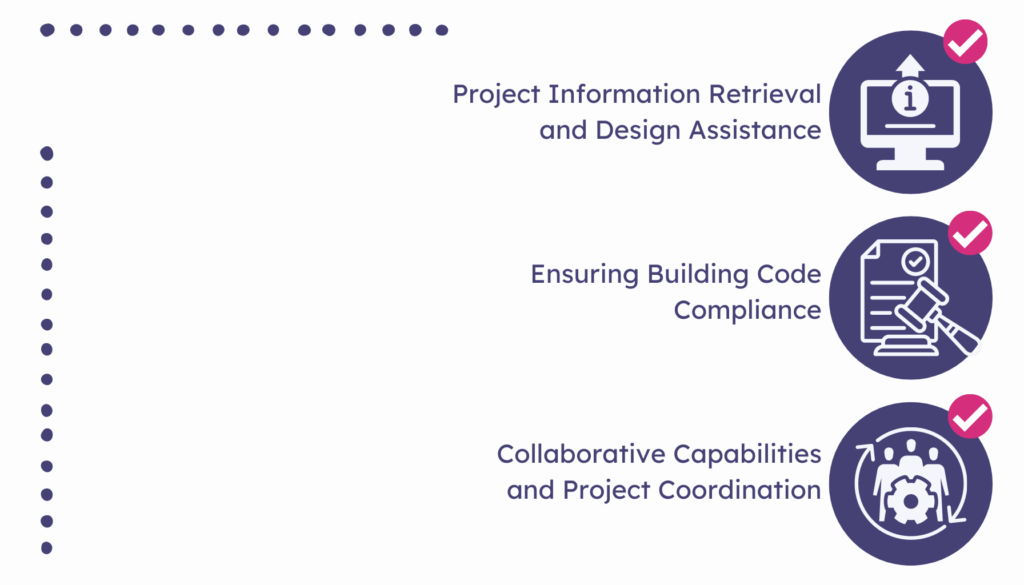
In the dynamic world of architecture, professionals constantly seek innovative tools and technologies to enhance their design processes and streamline project management. One such groundbreaking solution that has revolutionized the industry is conversational AI apps for architects. These intelligent applications leverage the power of artificial intelligence and natural language processing to provide architects with a new level of assistance and efficiency. By offering a conversational interface, these apps enable architects to interact, gather information, and receive valuable insights, ultimately transforming the way they approach architectural design and construction projects.
But conversational AI apps can also contribute to marketing efforts by enhancing client engagement, showcasing innovation, improving customer support, providing data-driven insights, and enabling thought leadership. By leveraging the capabilities of these apps, architectural firms can strengthen their marketing strategies, differentiate themselves from competitors, and ultimately attract and retain clients in a highly competitive industry
We’ll delve into the fascinating world of conversational AI apps for architects and explore the numerous benefits they bring to the industry. From project information retrieval and design assistance to ensure building code compliance and enabling seamless collaboration, these apps have the potential to transform the way architects work. We will uncover the key features and functionalities that make these apps invaluable tools for architectural professionals, as well as real-world applications that showcase their impact on design creativity and decision-making.
Understanding Conversational AI Apps for Architects
Conversational AI apps have emerged as transformative tools within the architectural industry, providing architects with intelligent and intuitive interfaces to augment their design processes and project management workflows. These applications leverage the advancements in natural language processing (NLP) and machine learning (ML) to enable seamless communication between architects and the app, unlocking a new level of efficiency and effectiveness.
At their core, conversational AI apps are designed to comprehend and respond to architectural professionals’ queries, commands, and requests in a conversational manner. By employing sophisticated NLP techniques, these apps have the ability to understand and interpret complex architectural terminology, jargon, and contextual nuances.
The incorporation of machine learning algorithms empowers conversational AI apps to continuously learn and adapt from user interactions, improving their accuracy and response quality over time. As architects engage with the app, it refines its understanding of architectural concepts, design preferences, and user requirements, ultimately enhancing the overall user experience.
Context understanding plays a pivotal role in the efficacy of conversational AI apps for architects. These apps are designed to comprehend not only the individual queries but also the context of the conversation as a whole. By analyzing the preceding dialogue and understanding the architectural project’s context, the app can provide more accurate and contextually relevant responses, further enhancing its usefulness to architects.
Integration with existing software and tools is a crucial aspect of conversational AI apps for architects. These apps are designed to seamlessly integrate with popular architectural software, such as computer-aided design (CAD) applications and project management systems. Through such integration, conversational AI apps leverage the data and functionalities of these existing tools, enabling architects to access project information, retrieve design files, and synchronize project updates effortlessly.
The ability of conversational AI apps to integrate with existing software enhances architects’ workflow efficiency and minimizes disruptions. By eliminating the need to switch between multiple applications or manually search for project information, architects can focus more on their core design tasks and leverage the power of conversational AI apps as valuable assistants in their day-to-day work.

Key Features and Functionality
Conversational AI apps for architects encompass a wide range of features that elevate the efficiency and effectiveness of architectural professionals. Let’s dive into the key functionalities these apps offer and how they benefit architects throughout various stages of the design and construction process.
- Project Information Retrieval and Design Assistance:
Conversational AI apps excel at swiftly retrieving project information, sparing architects the tedious task of manually searching through files and databases. Architects can simply converse with the app, requesting specific details such as floor plans, building specifications, or design documents. This feature streamlines information retrieval, saving architects valuable time, and allowing them to focus on the creative aspects of their work.
Conversational AI apps provide design assistance by offering valuable suggestions and recommendations. They leverage their vast knowledge base and machine learning algorithms to propose materials, products, and design elements that align with the architects’ requirements and preferences. This design assistance feature sparks inspiration and empowers architects to explore innovative design possibilities with ease.
- Ensuring Building Code Compliance:
Conversational AI apps play a critical role in ensuring architects adhere to building codes and regulations. By incorporating relevant code databases and rule sets, these apps assist architects in navigating the intricate web of compliance requirements. Architects can pose code-related queries to the app, which can provide real-time guidance and recommendations based on specific project parameters. This functionality minimizes the risk of non-compliance and helps architects design structures that meet the necessary safety and regulatory standards.
- Collaborative Capabilities and Project Coordination:
Collaboration lies at the heart of successful architectural projects, and conversational AI apps provide valuable tools for fostering seamless collaboration among team members. These apps enable architects to communicate, share updates, and exchange information effortlessly within a collaborative environment. Through chat interfaces or integration with project management systems, architects can assign tasks, discuss design decisions, and track project progress in real-time.
Conversational AI apps facilitate effective project coordination by serving as a centralized hub for project-related information. They allow architects to access shared project files, review feedback, and manage project milestones efficiently. By streamlining communication and coordination, these apps enhance teamwork and promote smoother project execution.
How Can Conversational AI Apps Contribute to Marketing Strategies?
Conversational AI apps can provide an interactive and personalized experience for potential clients. By integrating personalized experiences or virtual assistants into websites or marketing platforms, architects can engage with prospects in real time and provide valuable information about their services. This level of responsiveness and accessibility can help build stronger relationships with clients and increase the chances of converting leads into actual projects.
Increase +180%
leads
demos
sales
bookings
from your website with AI
Get more conversions from your existing website traffic delivering personalized experiences.

Additionally, these apps generate a huge amount of valuable data on user interactions, preferences, and inquiries. By analyzing this data, architects can gain insights into client needs, pain points, and emerging trends. These insights can inform marketing strategies by identifying target audience segments, optimizing messaging, and tailoring services to better meet client expectations.
Exploring the AI Technology Behind the Apps
Conversational AI apps leverage cutting-edge AI technologies to enable seamless interaction between architects and the app interface. These technologies encompass natural language processing, machine learning, and deep learning algorithms. By combining these components, conversational AI apps can understand complex queries, provide accurate responses, and continuously improve their performance over time.
- Natural Language Processing (NLP) and Architectural Query Understanding:
Natural language processing is a key component of conversational AI apps that enables them to comprehend and interpret human language. In the context of architectural queries, NLP algorithms process and analyze the specific language used by architects to pose questions or provide instructions. NLP algorithms break down sentences into individual words, identify the grammatical structure, and extract relevant information. Through techniques such as entity recognition and semantic parsing, conversational AI apps extract the architectural context from queries, allowing them to generate meaningful responses.
NLP plays a vital role in understanding architectural queries that often contain domain-specific terminology, design elements, and construction-related concepts. By employing sophisticated linguistic models, conversational AI apps can accurately interpret architectural queries, discern the intent behind the questions, and provide contextually relevant responses. NLP technology enables architects to interact with conversational AI apps in a natural and intuitive manner, bridging the gap between human language and computational understanding.
- Machine Learning Algorithms and Continuous Improvement:
Machine learning algorithms are integral to the performance and evolution of conversational AI apps. Through the analysis of vast amounts of data, these algorithms learn patterns, rules, and correlations that enable them to improve app performance over time. By leveraging historical user interactions and feedback, machine learning algorithms optimize response generation, accuracy, and relevance.
In the context of conversational AI apps for architects, machine learning algorithms learn from architects’ queries, preferences, and past interactions with the app. They analyze the input data to identify patterns and trends, which inform the app’s ability to understand architectural queries and generate appropriate responses. As architects engage with the app, machine learning algorithms adapt and refine their models, continually enhancing their understanding of architectural language, design preferences, and project-specific requirements.
The iterative nature of machine learning allows conversational AI apps to continuously evolve, becoming more accurate and efficient with each interaction. As architects utilize these apps, they contribute to the collective intelligence of the AI system, enabling it to provide increasingly tailored and insightful assistance.
Conclusion
Conversational AI apps have transformed the architectural industry by leveraging advanced technologies like natural language processing and machine learning. These apps streamline workflows, enhance productivity, and improve collaboration among architects. They provide valuable assistance in project information retrieval, design support, and ensuring building code compliance. With real-world applications that save time, boost creativity, and facilitate remote collaboration, conversational AI apps have become indispensable tools for architects.
Embracing these apps is not only strategic but also opens doors to enhanced productivity and creativity in the dynamic world of architecture.








